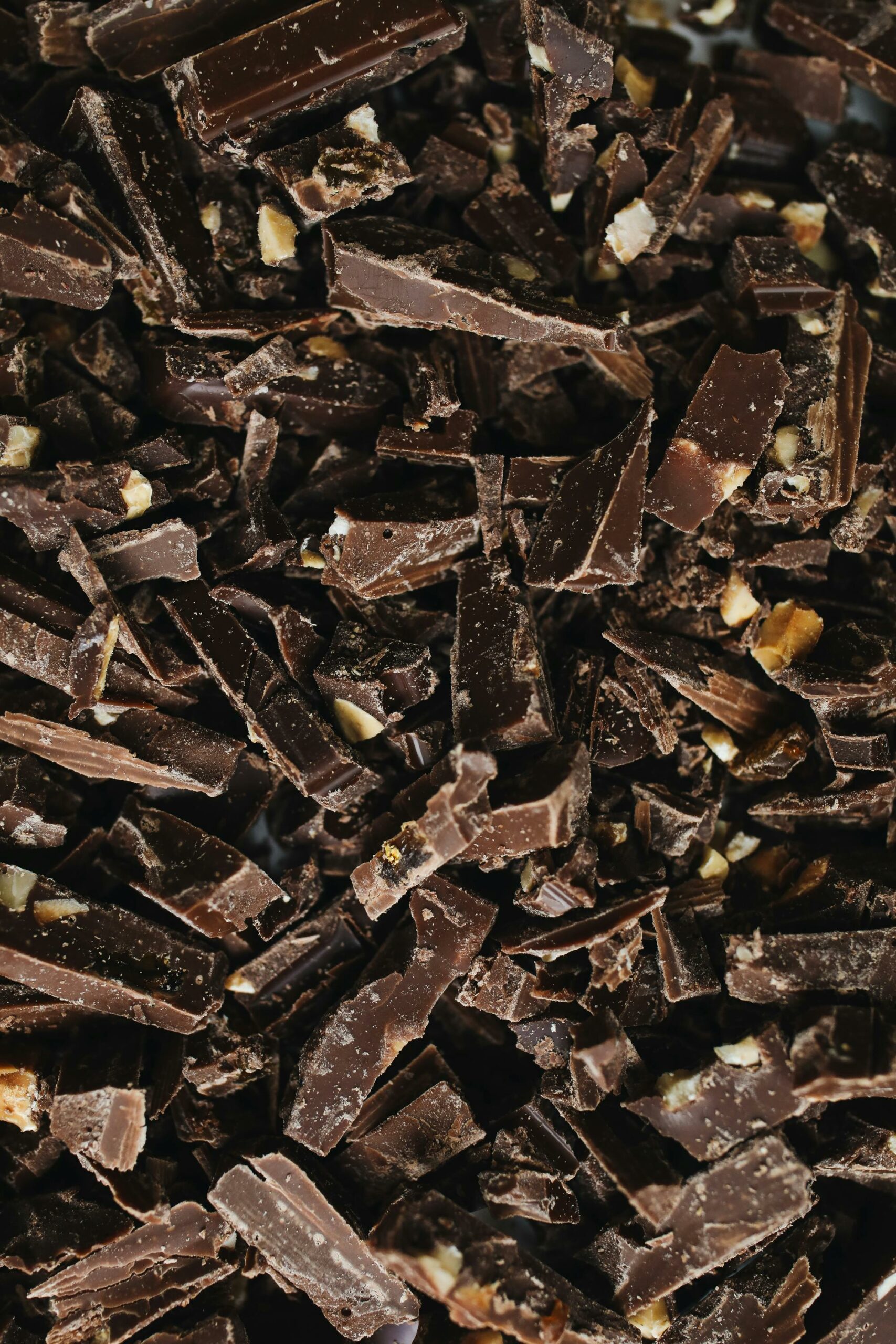Dark Chocolate Health Benefits Explained: Get Healthy Eating Chocolate!

There’s a cute quote that proclaims, “A balanced diet is a chocolate in both hands.” While this is meant in jest and is obviously not strictly true, there’s some truth to every joke and in this case, including dark chocolate in your diet might actually be healthy for you.
While most of us don’t need a second invitation to eat chocolate, it’s usually accompanied by feelings of guilt – when in fact, if it’s the right kind of chocolate and is eaten in moderate amounts, you might, in fact, be doing your body a wonderful service.
What Is Dark Chocolate? How Is It Different Than Milk Chocolate?

Dark Chocolate Or Milk Chocolate?
Black chocolate/plain chocolate – or, as it is most commonly known, dark chocolate – differs from milk chocolate in that there are no milk solids added, as there are to milk chocolate – it is made from natural cocoa butter, as opposed to the milk-based butter found in milk chocolate.
Both kinds of chocolate have cocoa solids, but milk chocolate also contains cream and more sugar, making it sweeter than its original counterpart and giving it fewer benefits due to its reduced cocoa content.
Dark chocolate can range from sweet to semi-sweet, to bittersweet, depending on its percentage of cocoa and sugar content, whereas milk chocolate is usually sweet. The percentage of cocoa in a dark chocolate bar can be relatively low (30%), resulting in a sweeter chocolate, to 75 or even 80% cocoa, and is usually comprised of cacao beans, sugar, lecithin and possibly flavoring.
The absence of milk products in dark chocolate gives it a more authentic chocolate taste, but can sometimes also give it a bitter aftertaste and a drier texture than milk chocolate.
Learn about the Health Benefits of Spinach and Blueberries at Maple Holistics!
Dark Chocolate Antioxidant Properties Explained
Your body creates oxidants in order to keep you healthy by fighting off viruses and microbes. However, too many oxidants are dangerous and linked to heart disease, which is why you have to have enough antioxidants to keep the oxidants in your body at bay.
Originally, it was believed that while chocolate contained antioxidants, they were not digested properly because of their size, so eating chocolate did nothing to provide the body with necessary antioxidants. But this was proven untrue when a study showed that while your body may not be able to digest the antioxidant molecules found in chocolate, microbes in your gut such as Bifidobacterium and lactic acid bacteria feed on the chocolate and ferment it, producing anti-inflammatory compounds which are beneficial for your heart and lower the risk of stroke.
The anti-oxidant properties found in cocoa beans (and, by extension, dark chocolate) are known as flavonols, and they help by fighting free radicals in the body; atoms which cause cell damage and can increase the chances of developing Alzheimer’s disease and heart disease. One study showed that people who included dark chocolate to their diet had lower levels of “bad” LDL cholesterol levels (a substance that increases your risk of developing coronary artery disease), higher levels of “good” HDL cholesterol levels (which lower the risk of heart disease), and higher blood antioxidant levels.
Me love chocolate, although not crazy about dark chocolate. #ChocolateDay #Chocolate #nationalchocolateday #nationalchocolatecupcakeday pic.twitter.com/ewC7gVNtJc
— Sarantos (@SarantosMelogia) October 28, 2017
Can Dark Chocolate Help Lower Your Cholesterol?

Dark chocolate may help lower cholesterol.
In a study done comparing people eating 1.7 ounces of dark chocolate to those eating equal amounts of white chocolate every day of the study, the people in the former group showed 20% higher levels of “good” cholesterol, and 20% lower “bad” cholesterol levels, when compared with those who had eaten white chocolate.
This is just one among other studies which have all shown that eating dark chocolate does, in fact, help to lower your cholesterol. If you’re eating chocolate to lower your cholesterol, be aware that chocolate with a lower cocoa content which has been processed is not a good choice because the processing lowers their flavonoid (flavonol) content, which is what helps to lower cholesterol.
The best option for cholesterol is dark chocolate with a cocoa content of 70% or more, and the least amount of processing possible. It’s also important to remember that chocolate does contain sugar and fat, and should, therefore, be eaten in moderation.
Can Dark Chocolate Make You Smarter?
Here’s an interesting one: dark chocolate may actually help with your cognitive function. (Who knew, right?) While the studies claiming that dark chocolate makes you smarter have been criticized as being weak and unreliable, they do seem to indicate an improvement in visual-spatial memory and organization, ability to remember spoken information such as a story or a list, abstract reasoning, and working memory, to name a few.
People who claimed to eat chocolate more than once a week scored higher on tests than those who said they eat chocolate less than once a week – but it’s not clear whether eating chocolate helped them do better, or whether smart people just like chocolate more. A study done on snails seems to prove that eating chocolate can help your brain to retain information and improve memory.
According to another study, “flavanols increase blood flow to the brain, promote the formation of new neurons, improve the functioning of neurons, enhance connections between neurons, and protect neurons from death by free radicals,” all of which contribute to improved brain function.
The results were shown to be the same in people regardless of their age. So, if you’re a chocolate lover and have a great memory, keep eating that chocolate – it may be helping you more than you had thought.
How Dark Chocolate Can Improve Your Heart Health
We have briefly touched on how dark chocolate can benefit your heart health, such as by lowering your cholesterol, which in turn improves blood flow around the body, but let’s explore it further. Platelet clumping, which can often cause the blood to clot, is severely dangerous and can cause a fatal heart attack if a clot blocks a blood vessel.
So how does eating dark chocolate help? Dark chocolate works in the same way as blood thinning medication. It thins your blood, which results in eased blood flow, and helps prevent blood from clotting. One of the ways your body naturally keeps your blood pressure lower is through a molecule called nitric oxide (NO), which relaxes your blood vessels and leads to easier blood flow and lowered blood pressure.
However, nitric oxide also produces toxic metabolites, which your body has to fight against so that they don’t cause damage. The polyphenols (flavonols) in cocoa help to protect your body against these metabolites and keep nitric oxide metabolism healthy in function. If you’re one of those people who eats chocolate when you’re stressed – it’s not just in your head; it actually is helping you calm down and making you feel less stressed!
Too much stress can cause blood pressure to rise, which affects the heart, and over time can cause a heart attack. Chocolate contains chemicals known as “endorphins,” which are known to relieve symptoms of stress and give the same happy feelings associated with a good workout (except without the fatigue). That doesn’t mean you should give up your exercise, though – eating chocolate before exercising can give you an energy boost, due to its caffeine content.
So, more energy = more successful workout = endorphins at work = happy feelings and less stress! Which is definitely a good thing for your heart.
Conclusion
As the Guardian so accurately put it, “If there’s one thing that people love more than chocolate, it’s science claiming that chocolate is good for you”, and I couldn’t agree more. While moderation is certainly the key here, it’s gratifying to know that you can enjoy your dark chocolate without worrying about its negative effects on your health – because its benefits far outweigh the negatives.
Dark chocolate’s benefits don’t just end after the minute of enjoying its taste but continue to do wonders for your body after being digested. So, now you know: it is possible to have your chocolate and eat it, too!



